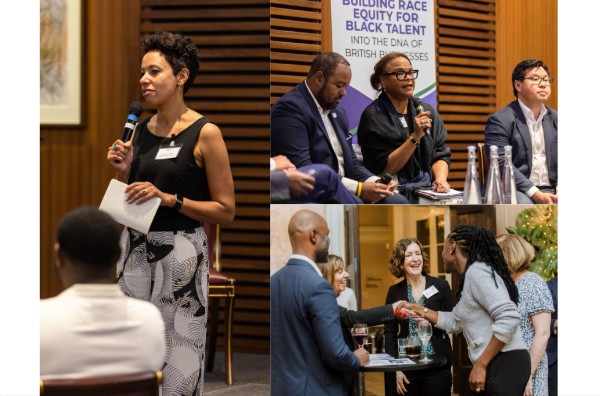
What led you to your role as Inclusion, Diversity and Equity Manager at KPMG?
My journey to becoming an Inclusion, Diversity and Equity Manager (IDE) at KPMG is deeply rooted in my personal values and experiences. Growing up, I was the first in my family to attend university, a privilege I wouldn't have had without the sacrifices of those who came before me. This experience instilled in me a deep appreciation for the importance of equity and fairness.
My previous experience in radio, where I provided a platform for historically excluded artists, further solidified my commitment to inclusion. I then found my first corporate role at SThree, where I discovered the field of Inclusion, Diversity and Equity. I immediately connected with the work and knew it was the career for me.
What has surprised you about your job and what inspires you?
From the moment I started, I was struck by the vibrant network of employee groups, steering committees, and partners who openly expressed their commitment to IDE. It was clear that this wasn't just a box to tick, but a genuine desire for positive change.
This widespread enthusiasm is what truly inspires me. It's the knowledge that there are so many people who want to see systemic change, who want to live in a world where everyone has a fair and equal chance to succeed. It's this collective desire that fuels my passion and motivates me to continue working towards a more inclusive future at KPMG.
What are the main challenges you currently face?
The global landscape and discourse around IDE presents a significant hurdle. This isn't just a personal challenge, but one faced by all IDE practitioners. It's like a pendulum swinging back and forth, requiring us to be strategic and adaptable in our approach.
Another challenge is recognising and respecting the diverse experiences of individuals within the organisation. There's no one-size-fits-all solution to IDE, as each group faces unique challenges and requires tailored interventions. This means focusing on smaller, targeted initiatives that may have a longer-term impact, which can be challenging when immediate results are desired.
How do you approach building an equitable and inclusive workplace at KPMG? Has this changed over time?
Our approach is guided by the belief that true inclusion requires a holistic and intersectional approach. We aim to create a culture where everyone feels valued, respected, and empowered to reach their full potential.
Over time we have brought together Capability and centrally led IDE initiatives into a new and refreshed programme offering. Inspire and Elevate take a truly intersectional approach, ensuring that individuals from all backgrounds have access to the same opportunities. They leverage the very best of our award-winning programmes from across our business. This ensures that everyone has equal access to opportunities to grow and develop. With work like this we aim to create a more equitable and inclusive environment where everyone feels supported and empowered to thrive.
Tell us about your Black Heritage Programme; when did it start, what does it involve, and what have you learnt about what it takes to deliver change?
KPMG's Black Heritage Allyship Programme was launched in 2021 with the aim of fostering meaningful connections and supporting the professional development of Black heritage colleagues. This reciprocal mentoring programme pairs junior Black heritage colleagues with senior colleagues from all backgrounds.
The programme has evolved over time, incorporating feedback from participants to ensure its effectiveness. At its core, it involves monthly mentoring meetings and learning sessions, providing a platform for knowledge sharing, career guidance, and building meaningful relationships.
One of the key takeaways from this programme is the crucial role of leadership buy-in in driving change. The fact that many of our mentors are directors or partners demonstrates a commitment from senior leadership to championing inclusion and diversity. These mentors are directly engaging with junior colleagues, gaining first hand insights into their experiences and challenges. This personal investment in their development is essential for creating a more equitable and inclusive environment. We hope that many of these mentoring relationships will evolve into sponsorships, providing even greater support and opportunities for career advancement.
The Black Heritage Allyship Programme is a testament to the power of leadership engagement and the importance of creating a culture where everyone feels supported and empowered to thrive. It's a programme that is constantly evolving, reflecting our commitment to continuous improvement and our dedication to building a truly inclusive workplace for all.
If you could change one thing about our collective approach to equitable representation of diverse talent in business, what would it be?
If I could change one thing it would be to increase the number of government-backed initiatives. Like The FTSE Women Leaders Review, which KPMG proudly sponsor, and The Parker Review, which focusses on improving ethnic diversity of UK boards, we need more government-backed initiatives to drive meaningful change. The Parker Review has been successful in increasing awareness, setting targets for representation, holding businesses accountable, and leading to real change. However, representation is just the start. To ensure that the change sticks, we need to make systemic changes that address the root causes of inequality. Government-backed initiatives can play a crucial role in driving these systemic changes.
Written by





